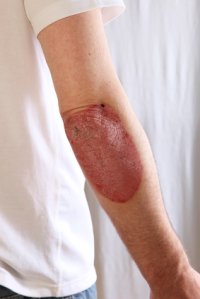Psoriasis can be treated by avoiding alcohol – and taking supplements of fish oil and vitamin D
 Psoriasis patients are generally interested in their diet and how it affects their disease. So far, there has not been much data so far to support a connection, but a new American study has mapped out the exact effects of regular diet habits and various supplements.
Psoriasis patients are generally interested in their diet and how it affects their disease. So far, there has not been much data so far to support a connection, but a new American study has mapped out the exact effects of regular diet habits and various supplements.
Psoriasis is a hereditary skin disease that affects around two to three percent of the population. Symptoms are red, thickened skin areas covered by glistening scales. The affected areas are typically the scalp, elbows, knees, and lower part of the back. Some people even develop a special type of rheumatism called psoriatic rheumatism. There are varying degrees of this condition, and people who have already experienced outbreaks of the disease may prevent it from reappearing with some luck by paying attention to factors that trigger the disease. Psoriasis appears to be an autoimmune condition. White blood cells migrate to the skin where they make skin cells proliferate too rapidly, thereby causing redness and scaling. It is commonly known that this activation may be triggered by stress, infection, and the use of certain drugs. However, the new study reveals that particular foods and deficiencies of certain nutrients also seem to play an important role.
Study methods and results
The scientists prepared a questionnaire with 61 questions about dietary habits and psoriasis symptoms and gave it to 1,206 psoriasis patients, all of whom were members of the National Psoriasis Foundation. Compared to age- and sex-matched controls, the psoriasis patients consumed significantly less sugar, whole-grain, dairy products, and calcium, whereas they ate more fruit, vegetables, and legumes.
The percentage of patients reporting skin improvements was highest after the following changes:
- Reduced intake of alcohol: 53.8%
- Reduced intake of gluten: 53.4%
- Reduced intake of nightshade plant (tomato, potato etc.): 52.1%
The percentage of patients reporting skin improvements was highest after using the following supplements:
- Fish oil: 44.6%
- Vitamin D: 41.0%
The percentage of patients reporting skin improvements was the highest after starting on the following diets:
- Pagano diet, a special psoriasis diet developed by Dr. Pagano: 72.2%
- Vegan diet (that excludes all foods of animal origin): 70.0%
- Paleo diet (that resembles the Stone Age diet): 68.9%
The patients also reported that their motivation to change their diets was a result of wanting to improve their general health.
References
https://link.springer.com/article/10.1007/s13555-017-0183-4
http://www.nutritioninsight.com/news/psoriasis-patients-cite-cutting-alcohol-taking-omega-3-as-best-ways-to-improve-skin.html
http://www.netdoktor.dk/emnecenter/psoriasis/hvaderpsoriasis.shtml
http://www.psoriasisselfmanagement.com/psoriasis-diet/dr-pagano-diet-for-psoriasis/
Search for more information...
- Created on .








